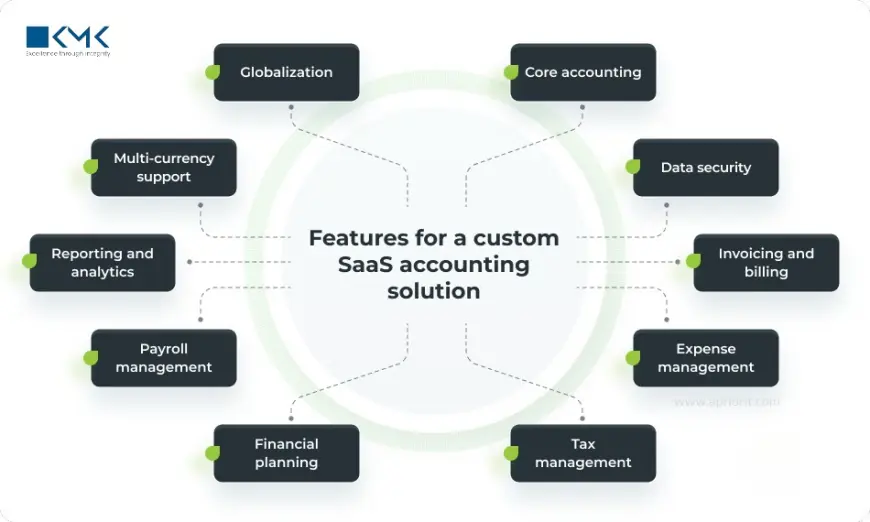How US Businesses Are Leveraging SaaS Outsourced Accounting for Growth
SaaS outsourced accounting as a smart solution to modernize financial management. But what exactly does this approach offer,

In today’s competitive economy, efficiency, accuracy, and agility define the financial success of businesses. As US companies adapt to changing market conditions, many are turning to SaaS outsourced accounting as a smart solution to modernize financial management. But what exactly does this approach offer, and why is it becoming such a powerful driver of business growth?
This article explores how SaaS outsourced accounting empowers US firms to streamline operations, optimize resources, and gain the flexibility needed to scale in 2025 and beyond.
What Is SaaS Outsourced Accounting?
At its core, SaaS outsourced accounting is a model where businesses rely on cloud-based accounting platforms combined with professional outsourced services to manage financial operations. Instead of building an in-house accounting department or handling all tasks manually, companies leverage software-as-a-service tools integrated with skilled accounting professionals.
This hybrid approach provides the best of both worlds:
-
Automation of routine financial tasks (invoicing, reconciliations, reporting).
-
Access to real-time financial insights via cloud-based dashboards.
-
Support from outsourced experts who understand compliance, tax laws, and financial strategy.
It’s no surprise that companies across industries—from startups to established enterprises—are embracing this model for sustainable growth.
Why Are US Businesses Choosing SaaS Outsourced Accounting?
The shift to SaaS outsourced accounting reflects broader changes in how organizations approach financial management. Let’s break down the main reasons driving adoption.
1. Cost Savings Without Compromise
Building an in-house finance team requires heavy investment in salaries, training, software licenses, and infrastructure. SaaS outsourced accounting eliminates those overheads. Businesses only pay for the services they need, making it cost-efficient and scalable.
2. Real-Time Financial Visibility
Cloud-based accounting platforms provide live dashboards, giving CFOs and decision-makers access to up-to-the-minute financial data. This helps leaders spot trends, identify cash flow issues, and make informed decisions faster.
3. Access to Expert Knowledge
US tax regulations and compliance standards can be complex. Outsourced accounting firms bring deep expertise, ensuring accuracy while reducing risks of errors or penalties.
4. Scalability for Growing Businesses
Whether a business is expanding into new markets or scaling operations, SaaS outsourced accounting allows financial services to grow seamlessly without adding internal headcount.
How SaaS Outsourced Accounting Drives Business Growth
The real value of this approach lies in how it supports long-term growth. Here’s how US companies are leveraging it to achieve measurable results.
Enhanced Cash Flow Management
Managing cash flow is critical for stability and expansion. SaaS outsourced accounting offers tools for automated accounts payable and receivable tracking, ensuring timely payments and faster collections. This leads to improved liquidity—a vital ingredient for growth.
Better Strategic Planning
With access to real-time financial data and outsourced CFO-level expertise, businesses can forecast revenues, plan budgets, and allocate resources more strategically. This strengthens financial decision-making and long-term growth strategies.
Improved Efficiency and Productivity
By automating routine accounting tasks, companies free up internal teams to focus on innovation, sales, and customer service. Efficiency gains directly contribute to business scalability and revenue growth.
Risk Reduction
Compliance risks, tax errors, and regulatory penalties can hinder growth. SaaS outsourced accounting minimizes these risks by ensuring accuracy and compliance through professional oversight.
Key Benefits at a Glance
To understand why more businesses are embracing this model, here’s a quick breakdown of the benefits:
-
Lower operational costs compared to in-house teams.
-
Automation of repetitive accounting tasks for efficiency.
-
Access to financial expertise without long-term hiring commitments.
-
Scalable solutions that grow with the business.
-
Enhanced compliance and risk management for peace of mind.
-
Real-time reporting for faster decision-making.
SaaS Outsourced Accounting in Action: US Business Use Cases
Many US businesses are already seeing the advantages of SaaS outsourced accounting. Here are some real-world examples of how it supports different sectors:
-
Startups and SaaS companies: They reduce overhead while gaining reliable bookkeeping and cash flow insights to attract investors.
-
Retail and eCommerce firms: With fluctuating sales cycles, outsourced accounting helps manage inventory, expenses, and seasonal revenue shifts.
-
Manufacturing companies: They benefit from improved financial tracking for supply chain costs and vendor management.
-
Professional services: Firms like law practices and consultancies leverage the model for accurate billing and expense tracking without needing in-house staff.
Future of SaaS Outsourced Accounting in the US
Looking ahead, SaaS outsourced accounting is expected to become even more integral to business operations. Emerging technologies like AI-driven analytics, predictive forecasting, and blockchain-based transactions will further transform the financial landscape.
For US businesses, this means:
-
Smarter insights for proactive growth strategies.
-
Greater integration between accounting and overall business operations.
-
Reduced dependency on internal teams for back-office work.
The combination of technology and outsourced expertise positions SaaS outsourced accounting as a long-term growth partner for organizations of all sizes.
Final Thoughts
For US businesses navigating the challenges of 2025—economic uncertainty, competitive markets, and rapid digital transformation—SaaS outsourced accounting offers a clear path to growth. It delivers cost efficiency, scalability, expert oversight, and real-time insights that traditional accounting models simply cannot match.
By outsourcing accounting functions through SaaS platforms, companies can focus more on innovation, customer engagement, and expansion, while leaving complex financial management in capable hands.
In short, SaaS outsourced accounting isn’t just a back-office solution—it’s a growth enabler for US businesses ready to scale with confidence.
What's Your Reaction?
 Like
0
Like
0
 Dislike
0
Dislike
0
 Love
0
Love
0
 Funny
0
Funny
0
 Angry
0
Angry
0
 Sad
0
Sad
0
 Wow
0
Wow
0














































